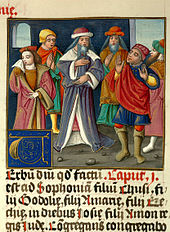Zephaniah
Zephaniah (/zɛfəˈnaɪ.ə/, Hebrew: צְפַנְיָה, Modern: Ṣəfanya, Tiberian: Ṣep̄anyā, "Concealed of/is YHWH"; Greek: Σοφονίας – Sōfənīəs) is the name of several people in the Hebrew Bible; the most prominent being the prophet who prophesied in the days of Josiah, king of Judah (640–609 BCE) and is attributed a book bearing his name among the Twelve Minor Prophets.
[4] The best known Biblical figure bearing the name Zephaniah is the son of Cushi, and great-great grandson of King[5] Hezekiah, ninth in the literary order of the Twelve Minor Prophets.
The unique source containing the minimal knowledge of his personality and rhetorical and literary qualities is the short, three chapter book of the Old Testament which bears his name.
Boldly predicting the destruction of Judah for the evil committed by its occupants,[1] the prophet spoke against the religious and moral corruption, when, in view of the idolatry which had penetrated even into the sanctuary, he warned that God would "destroy out of this place the remnant of Baal, and the names of the idolatrous priests" (Zeph 1:4), and pleaded for a return to the simplicity of their fathers instead of the luxurious foreign clothing which was worn especially in aristocratic circles (1:8).
The scheme of the book in its present form is as follows: He is commemorated with the other minor prophets in the calendar of saints of the Armenian Apostolic Church on July 31.


